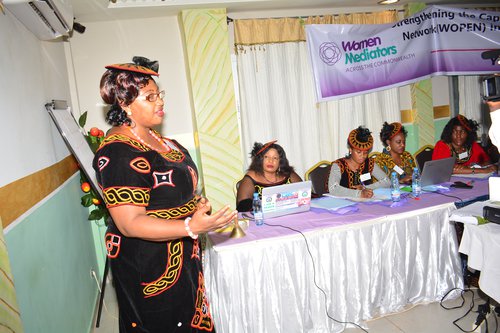Supporting women-led mediation initiatives

Supporting women-led mediation initiatives
Through small grants, the WMC supported women mediators to develop peacebuilding skills within their communities and to increase awareness of the important work already being done by women to resolve conflicts. Under the Strategic Mediation Fund, grants were awarded to mediation initiatives led by members of the WMC network.
These small grants, funded by the UK Foreign, Commonwealth and Development Office (FCDO), allowed members to carry out activities to increase the participation of women in peacebuilding locally and nationally, and directly fund their mediation work. This project also aimed to reduce some of the common barriers that prevent women and women’s organisations from accessing essential funds. This has been even more important during the COVID-19 pandemic as many of the women are at the front line of halting the spread of the virus and combating increasing tensions in their communities and further afield.
WMC members received grants for projects across the Commonwealth including in Fiji, Sri Lanka, Northern Ireland and Uganda. The overarching aim of all of the projects was to support women to take part in local mediation and peacebuilding efforts. The specific activities were tailored to suit the needs of the different contexts and ranged from conducting dialogues with conflict parties and creating safe spaces for women to come together to share their experiences of violent conflict, to mediation training and conflict analysis workshops. Importantly, activities also included an advocacy component and allowed the women involved to develop or strengthen their relationships with authorities or decision-makers.
Justina Mike and Lantana Abdullah received a joint grant to work with women in Kaduna and Plateau States in Nigeria. Their goal was to support women to undertake a conflict analysis of the situation in their communities so that they can advocate for more sustainable solutions to the violence. The training also gave the women the opportunity to take part in local mediation steering committees which have traditionally not included women. Justina said,
“There is a real lack of giving women the opportunity to participate. We need to enable women to be part of mediation and peace processes. If only women were given the opportunity like their male counterparts.”
The grants were awarded to projects that aim towards lasting impact, even if the project activities themselves cannot be sustained beyond the end of the grant period. Esther Omam Njomo received a grant to support her work with women in southwest Cameroon and she used the funding to train women to become peace ambassadors in 12 communities affected by conflict. The women were trained in community-based conflict resolution and mediation, and were provided with the skills and opportunity to engage with local authorities to discuss ideas to de-escalate tensions between communities. Esther said,
"WMC empowered me on mediations skills which [...] I am passing on as a gift to grassroots women so that they can actively play a part in problem-solving within their communities and families to avoid the escalation of many forms of conflicts."
An important feature of the WMC network is that it provides opportunities to enable the members to share their diverse experiences with each other. Those women with grants are able to discuss the lessons learned from their work with the rest of the network, and reflect on the value of the projects implemented, as well as the Strategic Mediation Fund mechanism itself.
Read the original article here.
Image: WMC member Adah Mbah Muyang training women in community mediation in Cameroon as part of the WMC Strategic Mediation Fund © Mother of Hope Cameroon (MOHCAM)
